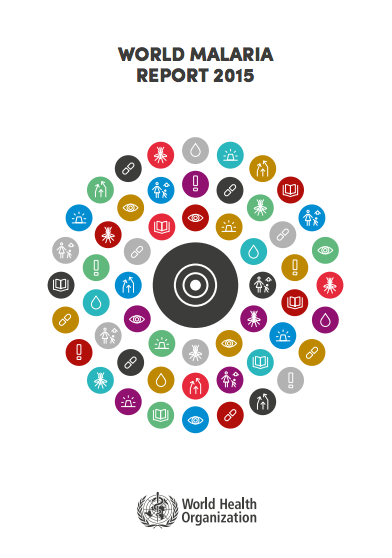
Cover of World Health Organization’s “World Malaria Report 2015,” which reported dramatic progress controlling malaria.
World Malaria Report 2015 dropped in mid-December, with United Nations-style fanfare.
Which means, you probably heard little to nothing about it in U.S. media, and “conservatives” and anti-science hoaxsters hope you won’t ever see it, so they can claim contrary to the facts that liberals kill kids in Africa.
My cynicism about the fight against malaria dissipates some, but my cynicism about hoaxes substituting for political dialogue grows.
World Health Organization (WHO) releases an annual report near the end of every year, detailing the fight against malaria and progress or lack of it.
Good news this year: WHO estimates deaths to malaria fell below 500,000 per year in 2015. That’s at least a 50% reduction since renewed vigor in the malaria fight in 2000, and it’s a 90% reduction from peak DDT use years, 1958-1963, when WHO estimated 5 million people died each year from malaria.
About 80% of malaria deaths take children under the age of 5.
Bigger picture: Malaria is on the run. Humans are winning the fight against malaria. Much remains to be done, however. Plus, malaria fighters warn that malaria can come roaring back, if governments neglect to follow through on promises of funding, and with well-run programs to cure humans of malaria and prevent new cases.
World Malaria Report 2015 should influence policy discussions in U.S. elections. But generally, this report was ignored.
Millard Fillmore’s Bathtub will feature in-depth discussions of parts of the report, and simple repetition for the record of the report, as part our long-term battle against hoaxsters who claim the U.S. ban on use of DDT on U.S. farms somehow increased malaria in Africa, and killed millions, when malaria actually decreased and millions were saved from death.
Malaria loses only with hard work on the ground by medical people treating and curing humans of the disease, and by public health people working hard to prevent new infections. Most of that work is not glorious, occurs relatively anonymously and away from television cameras and photographers with access to social media. Which is to say, the hard work of defeating malaria goes unsung around the world. We should work to change that.
What did others say about World Malaria Report?
A collection of Tweets, and other links, for your study.
http://twitter.com/bbbrieger/status/674591008139681793
http://twitter.com/wardhealth/status/674610775646978048
http://twitter.com/News__World/status/674612996484808704
http://twitter.com/DTNIndia/status/684830093085032448
- Bednet plan for underfed kids curbs malaria, SciNews
- How capitalism is making poverty history, The Telegraph
- Malaria treatment fails in Cambodia because of drug resistance, Reuters Foundation News
- Drug resistance a major threat to the world, malaria treatment fails in Cambodia, International Business Times



 Posted by Ed Darrell
Posted by Ed Darrell 





